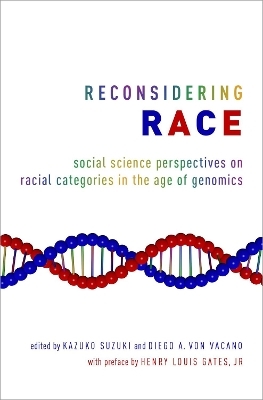
Reconsidering Race
Oxford University Press Inc (Verlag)
978-0-19-046528-5 (ISBN)
In order to more fully understand what we mean by "race", social scientists need to engage genetics, medicine, and health. To be sure, the long shadow of eugenics and the Nazi use of scientific racism have cast a pall over the effort to understand this complicated relationship between social science and race. But while the contributors of this volume reject pseudoscience and hierarchical ways of looking at race, they make the claim that it is time to reassess the Western-based, "social construction" paradigm. The chapters in this book consider three fundamental tensions in thinking about race: one between theories that see race as fixed or malleable; a second between the idea that race is a universal but modern Western concept and the idea that it has a deeper and more complicated cultural history; and a third between socio-political and biological/bio-medical concepts of race. Arguing that race is not merely socially constructed, the contributors, including Henry Louis Gates, Jr., Ann Morning, Jennifer Hochschild, Rogers Brubaker, Michael Keevak, Carolyn Rouse, and Sandra Soo-Jin Lee, offer a provocative collection of views on the way that social scientists must reconsider the idea of race in the age of genomics.
Kazuko Suzuki is Associate Professor of Sociology at Texas A&M University and the author of Divided Fates: The State, Race, and Korean Immigrants' Adaptation in Japan and the United States, winner of the 2017 Book Award on Asia/Transnational from the Asia and Asian American Section of the American Sociological Association. Diego A. von Vacano is Associate Professor of Political Science at Texas A&M University and the author of The Color of Citizenship: Race, Modernity and Latin American/Hispanic Political Thought and The Art of Power: Machiavelli, Nietzsche and the Making of Aesthetic Political Theory.
Preface: Race is Socially Constructed but Mutations Are Real
-Henry Louis Gates, Jr.
Acknowledgments
A Critical Analysis of Racial Categories in the Age of Genomics: An Introduction
-Kazuko Suzuki and Diego A. von Vacano
Part One: The New Challenges to the Social Construction Approach to Race
Chapter 1: Biological Theories of Race beyond the Millennium
-Joseph L. Graves, Jr.
Chapter 2: Americans' Attitudes on Individual or Racially-Inflected Genetic Inheritance
-Jennifer Hochschild and Maya Sen
Chapter 3: The Constructivist Concept of Race
-Ann Morning
Chapter 4: The Return of Biology
-Rogers Brubaker
Part Two: Race, Genomics, and Health
Chapter 5: A Sociogenomic World
-Catherine Bliss
Chapter 6: Nature versus Nurture in the Explanations for Racial/Ethnic Health Disparities: Parsing Disparities in the Era of Genome-Wide Association Studies
-Jay S. Kaufman, Dinela Rushani, and Richard S. Cooper
Chapter 7: Genetic Ancestry Tests and Race: Who Takes Them, Why, and How Do They Affect Racial Identities?
-Wendy D. Roth and Katherine A. Lyon
Part Three: Global Perspectives on Race and Genomics Debates
Chapter 8: Recasting Race: Science, Politics, and Group-Making in the Postcolony
-Ruha Benjamin
Chapter 9: Evidence of What?: Recreating Race through Evidence-Based Approaches to Global Health
-Carolyn Rouse
Chapter 10: How Did East Asians Become Yellow?
-Michael Keevak
Chapter 11: Reconsiderations of Race: Commissioning Parents and Transnational Surrogacy in India
-Sharmila Rudrappa
Chapter 12: Academic Regionalism and the Study of Human Genetic Variation in a Transnational Context: Asianism and the Racialization of Ethnicity
-Shirley Sun
Conclusion: Thinking about Race in the Age of Genomics: Assessments and Prospects
-Kazuko Suzuki and Diego A. von Vacano
Bibliography
About the Contributors
Index
| Erscheinungsdatum | 28.07.2018 |
|---|---|
| Vorwort | Jr Gates Henry Louis |
| Verlagsort | New York |
| Sprache | englisch |
| Maße | 236 x 163 mm |
| Gewicht | 567 g |
| Themenwelt | Sozialwissenschaften ► Ethnologie |
| Sozialwissenschaften ► Politik / Verwaltung ► Vergleichende Politikwissenschaften | |
| Sozialwissenschaften ► Soziologie | |
| ISBN-10 | 0-19-046528-X / 019046528X |
| ISBN-13 | 978-0-19-046528-5 / 9780190465285 |
| Zustand | Neuware |
| Haben Sie eine Frage zum Produkt? |
aus dem Bereich


